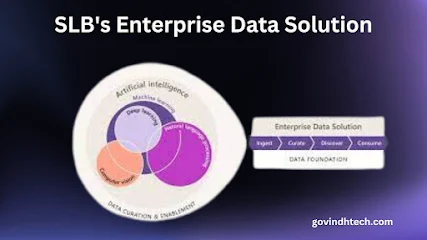SLB’s Enterprise Data Solution
Businesses in the energy sector are faced with juggling the ever-increasing demand for energy with the goal of achieving more sustainable, efficient operations as the industry innovates. Since reliable data is essential to reducing uncertainty and promoting confidence among decision makers worldwide, energy businesses have found success in using data as a key component of their ongoing evolution. However, it is challenging to access and analyze the data effectively due to the range of file kinds and data types that energy firms handle on a regular basis.
For this reason, Microsoft technologies including Azure Data Manager for Energy are used by energy firms all around the globe. The true interoperability of our cloud-based OSDU Data Platform across the production and exploration data environment optimizes client performance. Employees throughout a business may more easily and rapidly access the data they need by integrating it with industry databases, apps, and other cloud services. These sources might include databases that are still being used on-premises until a cloud migration is possible, as well as other data platforms for asset performance, the Internet of Things (IoT), or production. Simplifying procedures and decreasing productivity are the results of data silos; success depends on having optimal access to high-quality data.
A vital aspect of Microsoft’s strategy for providing its clients with cloud-to-edge solutions, services, and technology is the Microsoft partner ecosystem. The Enterprise Data Solution was created to integrate easily with Azure Data Manager for Energy, simplifying data ingestion, administration, and discoverability for domain applications. SLB is one of Microsoft’s key partners in the energy industry.
SLB’s Enterprise Data Solution makes daily tasks easier
Enterprise Data Solution from SLB is designed to make handling massive amounts of data that are often held in separate silos easier. It does this by providing a user-friendly, inclusive interface that makes the process of data intake, curation, and accessibility easier. Instead of requiring many steps to achieve the same objectives, consumers can access data with only one click thanks to SLB’s Enterprise Data Solution. This facilitates quicker data access and intake of various data kinds and formats for a range of end users. Additionally, several AI-enhanced solutions, such as more efficient unstructured data intake, data quality control, contextualization, and data mastering, help with the curation of data throughout this pipeline by lowering the need for human involvement.
When data and application compatibility are accomplished, technical procedures for new energy sources and existing energy sources are optimized. For example, SLB’s Enterprise Data Solution may significantly enhance managing massive amounts of seismic data (access, ingestion, and streaming). This also results in a large reduction in the normal cost for processing these workloads, which speeds up processes and lets customers include as much different domain data as feasible. In the end, geoscientists and engineers may swiftly provide the most correct data by running more scenarios in various applications, comparing the outcomes with their peers.
The following are the main characteristics of SLB’s Enterprise Data Solution:
Ingest
Easily gather, ingest, and stage data for document transcription and processing from desktop or other file sources. For instance, you may automatically translate file updates into the appropriate schema by using a cloud-style file drop. AI is helping to lessen the need for human labor in this regard.
Curate
A lot of time is lost due to issues with data quality, which are at the core of many industrial concerns. SLB’s Enterprise Data Solution streamlines the process of curation and refinement of datasets into reliable data products, releasing them with ready-to-use tools for data quality. AI is one of these instruments for mastering and quality control.
Find out
Online data-asset screening and analysis for speedy creation of collections and consumption from domain processes is made possible by ready-to-use data products. Finding and using high-quality data is essential for making decisions. SLB’s Enterprise Data Solution makes it possible for processes to access the appropriate data so that stakeholders can find, view, and use it with ease.
Consume
Whether it’s the Delfi digital platform, Petrel subsurface software, or Techlog wellbore software, analysts and others may easily obtain reliable data products from inside their familiar applications and processes with the help of SLB’s Enterprise Data Solution. Complete data lineage, project versioning, and an easy-to-use web browser interface are all readily available in an efficient manner. Workflows like machine learning property modeling, machine learning seismic interpretation, and seismic processing may exchange and use data. Furthermore, this data may now be readily used with Microsoft Azure tools or in machine learning workbenches like Delfi Data Science. This saves time for decisions and actions, which are essential for an efficient manufacturing process.
Unlock benefits farther down the Microsoft ecosystem
After data is stored in Azure Data Manager for Energy, it complies with the OSDU Technical Standard and provides a dependable foundation for data consumption and iterative re-ingest by other applications. Azure Data Manager for Energy’s interoperability enhances data accessibility, traceability, and validity, enabling data scientists and domain users to provide business results more quickly.
By streamlining the process of ingesting massive volumes of high-quality, reliable, and traceable data into Azure Data Manager for Energy, SLB’s Enterprise Data Solution enables users to get the most out of the platform. In the end, clients benefit from Azure Data Manager for Energy’s interoperability as it harmonizes data that can be used across the Microsoft ecosystem.
Once this data is on the platform, there are several chances to use Microsoft Azure OpenAI Service to further enhance Microsoft 365 apps downstream with more insights and efficiency. For instance, end users may create Open XML documents that are suitable for usage in Microsoft Excel, where they can be more readily viewed, and extract tables straight from ingested documents.
News source: Enterprise Data Solutions











0 Comments